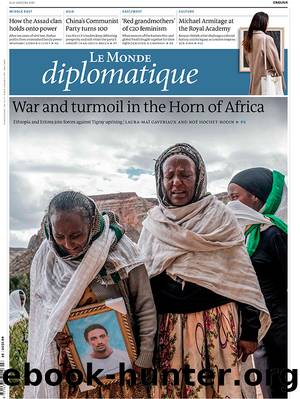July 2021 by Le Monde diplomatique

Author:Le Monde diplomatique
Language: fra
Format: epub
Publisher: Le Monde diplomatique
Published: 2021-07-02T00:00:00+00:00
âThis cooperation helpedâ
Although relations could sometimes be strained, women did build new transnational networks. The Zambian feminist Lily Monze, a former member of the official Zambian delegations to Copenhagen and Nairobi and later ambassador to France, attended her first international womenâs conference in Moscow. When I interviewed her in 2012, she reaffirmed that the Eastern bloc countries had provided a wide variety of support for African women willing to stand up against western imperialism: âThis cooperation helped. For instance, provision of scholarships for some of the women here to go and study, exchange visits; sometimes they would pay for our attendance at these conferences.â
The activism and material support provided by the socialist countries forced the US government to fund liberal feminist organisations (concerned mainly with sexual equality) in the global South. So, whether their country was aligned with the Soviet Union or the US, women in the South benefited financially from the rivalry between the major powers and were able to attend a wide variety of international events during the Decade for Women.
When I began researching the international womenâs movement in 2010, I had no idea how far history had been skewed in favour of American feminists and their allies in the West. Given the influence of the coalition of socialist and communist women from the Eastern bloc and the global South at the UN, and the enduring reverberations of their international exchanges, how is it that their stories have been erased?
Part of the answer lies in the brutal transition from communism to âdemocracyâ and free markets. The women I interviewed in Bulgaria between 2010 and 2017 were subsisting on tiny pensions of roughly â¬200 a month. Even if they had saved for their retirement, they lost everything when the Bulgarian banks collapsed in the mid-1990s. And even if they had cash under a mattress, its value evaporated during the hyperinflation that followed. Public services disappeared, the healthcare system collapsed, and the prices of prescription medicines skyrocketed.
Download
This site does not store any files on its server. We only index and link to content provided by other sites. Please contact the content providers to delete copyright contents if any and email us, we'll remove relevant links or contents immediately.
The Bomb, the Bank, the Mullah and the Poppies A Tale of Deception by Iqbal Chand Malhotra(178)
The Political Animal by Jeremy Paxman(177)
The Destiny of Civilization: Finance Capitalism, Industrial Capitalism or Socialism by Michael Hudson(164)
A Secret Order: Investigating the High Strangeness and Synchronicity in the JFK Assassination by H.P. Albarelli(152)
Holtsclaw by H. D. Jacobsen(151)
Secret Freedom Fighter: Fighting Tyranny Without Terrorizing The Innocent by Jefferson Mack(150)
Chariots of the Desert by The Story of Israeli Armoured Corps(149)
West Asia At War by Talmiz Ahmad(148)
Everything You Really Need to Know About Politics: My Life as an MP by Phillips Jess(146)
January 2024 by Le Monde diplomatique(134)
Germany and Two World Wars by Egon Harings(128)
The Law of War and Peace by unknow(128)
America Invulnerable. The Quest for Absolute Security from 1812 to Star Wars by James Chace Caleb Carr(127)
The First Dissident by William Safire(123)
Towards a Socially Sustainable World Economy : An Analysis of the Social Pillars of Globalization by Raymond Torres(114)
The Palgrave Handbook of Global Politics in the 22nd Century by Unknown(109)
Israel in the mind of America by Grose Peter 1934-(109)
Potent natural egg-laying stimulant for cabbage butterfly <Emphasis Type="Italic">Pieris rapae <Emphasis> by Unknown(104)
Napolitano 3 in 1 by Andrew Napolitano(102)
